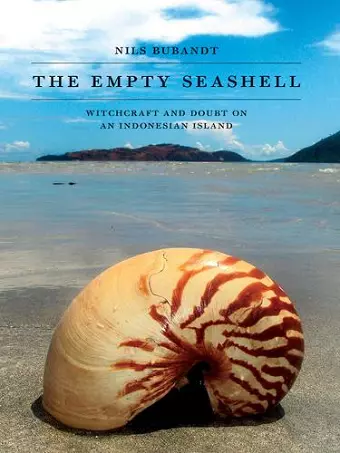The Empty Seashell
Witchcraft and Doubt on an Indonesian Island
Format:Paperback
Publisher:Cornell University Press
Published:8th Dec '14
Currently unavailable, and unfortunately no date known when it will be back
This paperback is available in another edition too:
- Hardback£108.00(9780801452956)

The Empty Seashell explores what it is like to live in a world where cannibal witches are undeniably real, yet too ephemeral and contradictory to be an object of belief. In a book based on more than three years of fieldwork between 1991 and 2011, Nils Bubandt argues that cannibal witches for people in the coastal, and predominantly Christian, community of Buli in the Indonesian province of North Maluku are both corporeally real and fundamentally unknowable. Witches (known as gua in the Buli language or as suanggi in regional Malay) appear to be ordinary humans but sometimes, especially at night, they take other forms and attack people in order to kill them and eat their livers. They are seemingly everywhere and nowhere at the same time. The reality of gua, therefore, can never be pinned down. The title of the book comes from the empty nautilus shells that regularly drift ashore around Buli village. Convention has it that if you find a live nautilus, you are a gua. Like the empty shells, witchcraft always seems to recede from experience.
Bubandt begins the book by recounting his own confusion and frustration in coming to terms with the contradictory and inaccessible nature of witchcraft realities in Buli. A detailed ethnography of the encompassing inaccessibility of Buli witchcraft leads him to the conclusion that much of the anthropological literature, which views witchcraft as a system of beliefs with genuine explanatory power, is off the mark. Witchcraft for the Buli people doesn’t explain anything. In fact, it does the opposite: it confuses, obfuscates, and frustrates. Drawing upon Jacques Derrida’s concept of aporia—an interminable experience that remains continuously in doubt—Bubandt suggests the need to take seriously people’s experiential and epistemological doubts about witchcraft, and outlines, by extension, a novel way of thinking about witchcraft and its relation to modernity.
In this intriguing study of witchcraft in a Buli community in Indonesia, [Bunandt] sets out to explore the complex nature of witchcraft in that community as something that exists but is unseen.... Overall,this well-written and welcome book adds to the understanding of witchcraft in anthropology, especially in regard to doubt and modernity.
* CHOICE *Bubandt likens the witch-menace to nuclear war on terrorism: 'a threat that is both real and yet often absents itself from daily experience.' Witchcraft is, therefore, a paradox: it's everywhere and nowhere, real and impossible,hauntingly vivid yet intangible and invisible.... Bubandt describes a characteristic of the human mind that is universal yet not always obvious to those proud of their post-Enlightenment heritage. Our brains are simultaneously full of knowing and not knowing,believing and doubting, fearing and rationally dismissing fears. We know these to be incompatible opposites, but can't help having them both in play at any one time. And so we comfort ourselves with the illusion of singularity, and of secular triumph. One thing we know for sure is that we have to appear to know things, when really we may know nothing at all.
-- Malcolm Gaskill * Fortean Times *The Empty Seashell never strays far from the scene of witchcraft, from the myths that offer historical and ontological explanations for the close knit between human life and witchcraft in Buli through accounts of individual lives rent apart by accusations or attacks to the destructive ramifications of such occurrences for the community, including how incidents may reverberate across generations as old grudges or suspicions are resurrected to animate new ones.... Bubandt is to be commended for highlighting the precariousness and forces of world-unmaking that are as much a part of social life as the assumed sturdiness that prevails in social scientific works.
-- Patricia Spyer * Anthropological For- Winner of Honorable Mention, Clifford Geertz Prize (Society.
ISBN: 9780801479458
Dimensions: 235mm x 155mm x 19mm
Weight: 454g
320 pages